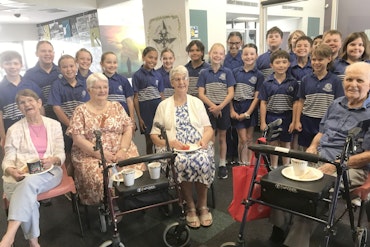ROYAL COMMISSION: Carers know best
The third day of the Mildura hearings for the Royal Commission into Aged Care Quality and Safety heard from two carers and their struggle with aged care staff not providing appropriate care, along with the importance of all aged care services having culturally specific training.
![<p>Mrs Kay Gray gave direct evidence to the Royal Commission via video link to explain her struggles with aged care staff who didn’t listen to her care instructions. [Source: Aged Care Royal Commission]</p>](https://agedcareguide-assets.imgix.net/news/articles/news/articles/Screen-Shot-2019-07-31-at-10.07.13-am.png?fm=png&format=auto&w=550&q=65)
Mrs Kay Gray gave direct evidence to the Royal Commission via video link to explain her struggles with aged care staff who didn’t listen to her care instructions. [Source: Aged Care Royal Commission]
The Commissioners heard direct evidence from Kay Gray from Port Macquarie and her experiences caring for her husband of 52 years, and Danijela Hlis, a Slovenian migrant living in Queensland who undertook the carer role for her migrant parents with no English proficiency.
Both Mrs Gray and Ms Hlis outlined struggles with the aged care facility staff, who didn’t listen to their advice or suggestions on how to properly care for their family member.
Care requests not taken into consideration
Mrs Gray’s husband, Clive, had Alzheimer’s and required 24-hour care, since he was unable to drink and eat without being prompted.
Her whole life revolved around meeting his needs but sometimes she needed a break, and would place him in respite care.
On one occasion, Mrs Gray decided she needed a holiday and placed her husband into respite care at a facility and watched as his health declined rapidly within nine days before removing him from the nursing home.
No matter how many times she reminded the facility that he was unable to feed, drink or take any care of himself, they still kept treating him as if he was competent.
Mrs Gray says, “It made me very angry and upset. No matter what I said to them, they didn’t seem to understand what was happening. I started to think, “why did I put him in here?”
“He just looked shocking, he looked so different to when I had taken him in nine days before. I decided to remove him immediately [from the facility]… I was more or less blaming myself for leaving him there as long.”
Mrs Gray put a complaint into the facility about the poor care provided to her husband, and received multiple forms of response, both in written letters and over the phone, where the facility referred to her husband as “Mr Barlow” and herself as “Mrs Barlow”.
Still to this day, she does not know who Mr and Mrs Barlow are, but Mrs Gray says she had to laugh at the joke of it all.
Mr Gray has been living in a new facility since April 2019 and has been enjoying a facility that takes proper care of him.
She says it has been difficult giving up all of her caring responsibilities for her husband but knows he is receiving “marvellous” care.
“After kind of being with someone for so long, being married for so long, I’m finding it very hard without him, I miss him terribly. Even though he has Alzheimer’s, he was still there. You still had his presence and I miss that,” says Mrs Gray.
“But I know that he needs to be where he is and it is better for him, and I will adjust eventually.
“I don’t think the [last facility] staff were capable of properly handling severe Alzheimer’s patients… He looked like a healthy 88-year-old man, but that is not what Alzheimer’s is all about. I think they really couldn’t understand, even though I had written a report, I had told them, repeatedly. I don’t think the staff fully understood how to care for Alzheimer’s patients.”
Facilities not culturally competent
Ms Hlis, retiree in Buderim, Sunshine Coast, explained her struggle caring for her Slovanian parents, the emotional toll it took on her own wellbeing and the issues she faced with facilities not able to provide care to people with cultural backgrounds.
Her parents had moved from Slovenia specifically to get care from their children because they didn’t trust the aged care services available in their home country.
Ms Hlis described her family life as “unhappy” when she was younger, but managed to repair the relationship between herself and her parents, resulting in them moving in with her in Tasmania.
Her mother had severe depression, addiction problems and was diagnosed with cancer, while her father had diabetes and heart problems.
The initial care worked well, but was incredibly stressful on Ms Hlis, who took most of the caring burden on even though her siblings had planned to share the responsibility.
With her parents ageing, their history of living through two wars caught up with them causing medical complications. Her father had suffered multiple heart attacks and eventually died, while her mother developed dementia.
The care needs for her mother became too great and she had to put her in aged care around 2011, which angered her mother greatly.
Ms Hlis described the caring experience as destroying her completely since she was unprepared and unaware of what she had to give up, her stress even leading to a suicide attempt.
The aged care facility her mother was placed in struggled with her cultural background and how to communicate effectively with her, which Ms Hlis believed resulted in the unnecessary death of her mother.
“I think carers are taken so much for granted because especially carers of cultural different backgrounds are, in many countries, expected to look after our parents,” Ms Hlis says.
“These carers are facing enormous difficulties in caring for their parents, sometimes 24 hours a day for years and years. Besically, especially with dementia, if a person is otherwise physically and reasonably well, it can go on for many years.”
One point Ms Hlis hammered home to the Commission, was not only that aged care facilities were not prepared for taking care of someone with a cultural background, but also that people of culture are excluded from any studies of dementia.
“I don’t think we have paid much attention in Australia to the needs of people born outside of Australia until now. I’m extremely grateful to be here today. I think all the migrants who have helped build Australia are now ageing, forgetting their English, either due to dementia or just old age,” says Ms Hlis.
“[Migrants] have been excluded from dementia or aged care-related research. We allow researchers to get research grants with discrimination centres such as English proficiency required for participating in research.
“These are thousands of thousands of people who have lived here are now reverting back to their culture and their language, but they have not been heard or included or listened to, until now… I am talking of thousands and thousands of people who have actually been educated in Australia, who came here like little children… and are, because of dementia, reverting back to their mother tongue.”
Ms Hlis wants the Home Care Packages and Aged Care Assessment Team (ACAT) to take the carer into account as well as the client, because that relationship is a partnership and they both need assistance.
She added that all day centres and nursing homes need to have cultural competency audits to make sure they are able to take care of a person with a cultural background.
The next hearing will take place on Monday, 5 August in Brisbane, Queensland.






















